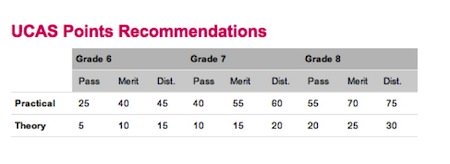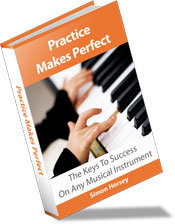Should I learn an instrument?
Many parents wonder whether it is a good idea for their child to learn an instrument. Here are some of the pros and cons of learning an instrument to help you decide.
First it is probably a good idea to mention that I believe it is possible for anybody to learn an instrument. You may not become the next Mozart, but you will develop a valuable skill that could potentially give you pleasure for the rest of your life. As I say in my book Practice Makes Perfect I have lost count of the adults I have spoken to across the world who regret not continuing with, or taking the opportunity to learn an instrument.
Advantages and benefits of learning a musical instrument
Here are some of the pros of learning a musical instrument. This is just a quick list I came up with, I'm sure you can think of more!
- You develop a new skill which sets you apart from those that can’t play and don't learn an instrument
- Learning an instrument teaches you the value of practice - if you work at something in an organized way, you get better at it
- When you learn an instrument you learn how to practice. Many musicians who have effective practice strategies can apply these to other situations, transferring their skills to other areas of life to assure themselves of success. Look at many successful people and you will find they learned an instrument when they were young.
- Learning an instrument adds another string to your bow (sorry, couldn't resist that one) When applying for schools, universities, jobs etc., it is something extra you have done and may just give you an edge over your competitors. An employer can see you have the commitment, organisation and tenacity needed to work on a long-term project. In the UK having Grade 6,7 or 8 gives you valuable UCAS points when you apply to university. Click on the image below for more details.

- Making music is a creative activity and when you learn an instrument it helps your creative thinking in other areas of life.
- Playing music often helps you mix with different social groups and make new friends. Singers and other instrumentalists often need accompanists, and rock and pop bands are often short of an instrumentalist. Depending on your instrument you could also join an orchestra or other school band.
- Additional income. If you play an instrument you can often utilize that skill to make some extra money by playing in a restaurant or busking! I remember making almost as much busking in a day as some of my friends did working in a factory or on a supermarket check out till. Think about it: which would you rather be doing, standing in the sun playing music or sitting at a checkout till all day? Of course, it was a bit chilly in the winter, but we tended to make more money near christmas! There is also the option of finding work in a local hotel or other event or getting gigs for a band.
Disadvantages of learning an instrument
Yes, there are a few, but I always think the pros outweigh the cons!
- Learning an instrument can be expensive once the cost of lessons, an instrument and extras such as music, strings, reeds etc. are added in. Parents often have to budget very carefully to allow their child to have lessons
- Time: there is no doubt that practice makes perfect, and students of any instrument will need to spend adequate time practicing. This doesn't have to be hours and hours each day, but there is a time commitment and it is good to realise this before you start. However, since you are reading this site you are well armed with strategies to make your music practice more effective, especially if you have read my book Practice Makes Perfect as well!
Should I learn an instrument to make me smater?
There is a considerable body of research to show that learn an instrument it can improve your performance across the board in academic subjects. There is also plenty of pseudo-science around about learning instruments. Yes, Einstein did play the violin as did Donald Glaser, who won the Nobel Prize for Physics in 1960 for his Bubble Chamber invention. Thomas Edison and Alexander Graham Bell both played piano… the list goes on. Even Neil Armstrong apparently plays the baritone horn. Along with these amazing scientists many others didn't play instruments. We also have to look at the time they lived, when many children were taught piano, violin or other instruments as a matter of course. I'm not saying music doesn't help, especially as I believe it does (as did Einstein), but it is important to keep these things in context.
There are many arguments put forward for the fact that playing an instrument helps with thinking and learning skills. When you learn an instrument you are reading, decoding the notes, playing the instrument (exercising gross and fine motor control) and listening…all at the same time. This helps you overcome the 'right or left brain bias' that most people have, and use your whole brain. As you play your instrument more, your brain becomes used to working as a whole, right and left hemispheres together, and consequently works this way in other areas of your life as well.
"Experience with music appears to help with many other things in life, potentially transferring to activities like reading or picking up nuances in tones of voices or hearing sounds in a noisy classroom better"
- Nina Kraus, neuroscientist at Northwestern University
Musicians also learn from an early age that to achieve something needs work and practice. They are able to break larger tasks into sections and complete each section, with a clear vision of the end product. Musicians experience success from learning short pieces early on and this teaches them the formula amount of practice (work) = level of success. This is a formula that many non music students in the 'instant gratification' world we live in today, don't learn.
Music students also learn to organize their time. They have music practice on top of regular school work and any other extra-curricular activities they are involved with. The maxim of if you want something done, ask a busy person tends to apply here. The music student has to be very organized with tasks and time if they are to fit practice in as well as school work and (importantly) having a life!
Here are some links that explain some of the experiments and science behind why learning a musical instrument can actually make you smarter.
Here is a great interactive infographic about how music benefits your mind. You can also read an article from the science pages of The Independent Music has the power to shape a child's mind and an article in Live Science about the way in which learning an instrument can significantly enhance the brain and sharpen hearing for all kinds of sounds, including speech.
The Mozart Effect
There is a whole industry built up around some the misinterpretation of some 1993 research by Rauscher et. al. The research was misinterpreted from a 15 minute slight increase in spacial reasoning, to mean listening to Mozart increases your IQ. Then why bother learning an instrument or doing any other form of study when all you need to do is listen to Mozart? While listening to Mozart is highly recommended, he wrote some of the most beautiful music you are ever likely to hear, (along with Bach, Beethoven, Handel, Haydn, Chopin, Schubert…the list goes on) it will not, on itself, give you any long-term intellectual benefit. However, if you learn an instrument it might; and even if it doesn't you'll gain a life long skill that will give you, and many others, enjoyment. The 'many others' will also probably be extremely envious of you too!
Expert Practice Secrets
Frustrated with your practice? Read Practice Makes Perfect and hack the 10,000 hour rule. Cut your practice time by up to 25%! Make faster progress, learn pieces and scales faster, memorize more easily, and much more. "If you play an instrument you need this book!"
Recent Articles
-
Curdridge Parking
Jul 10, 25 06:11 PM
-
How To Speed Up Scales and Improve Accuracy
Oct 13, 24 04:23 AM
How to speed up scales is something many people want to know, but speed should also come with accuracy. Read on to find out how to do both. -
From an opera singer, on her death bed to Leonard Bernstein
Jan 29, 24 03:36 PM
I enjoy reading the music more than hearing it. From an opera singer, on her death bed to Leonard Bernstein

New! Comments
Have your say about what you've just read!Leave me a comment in the box below.